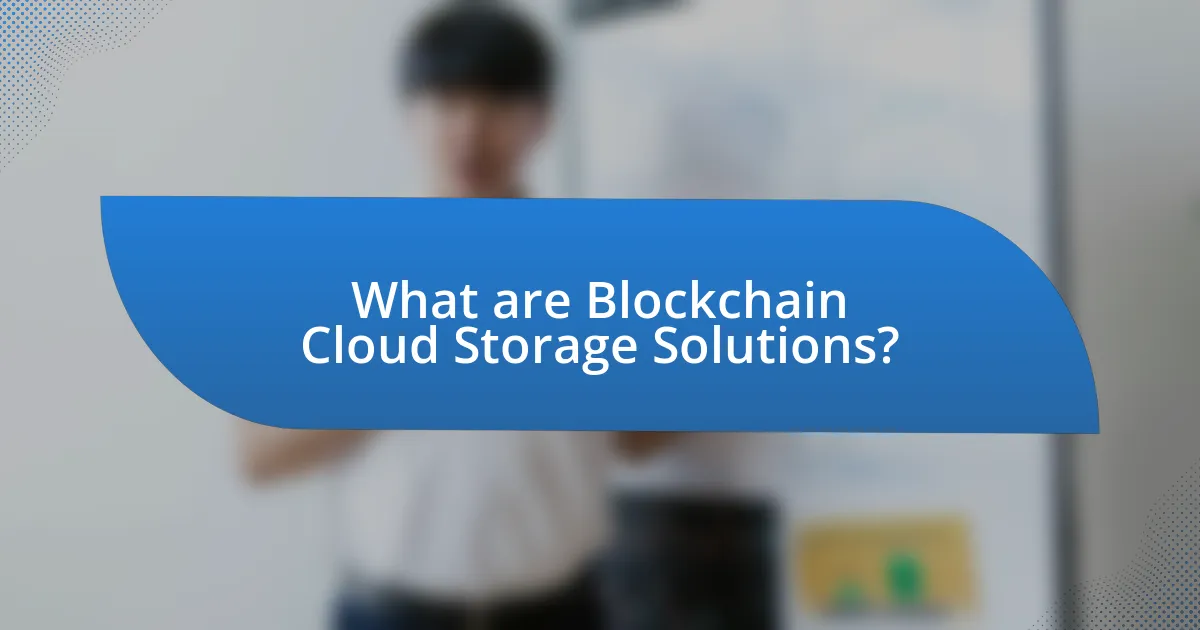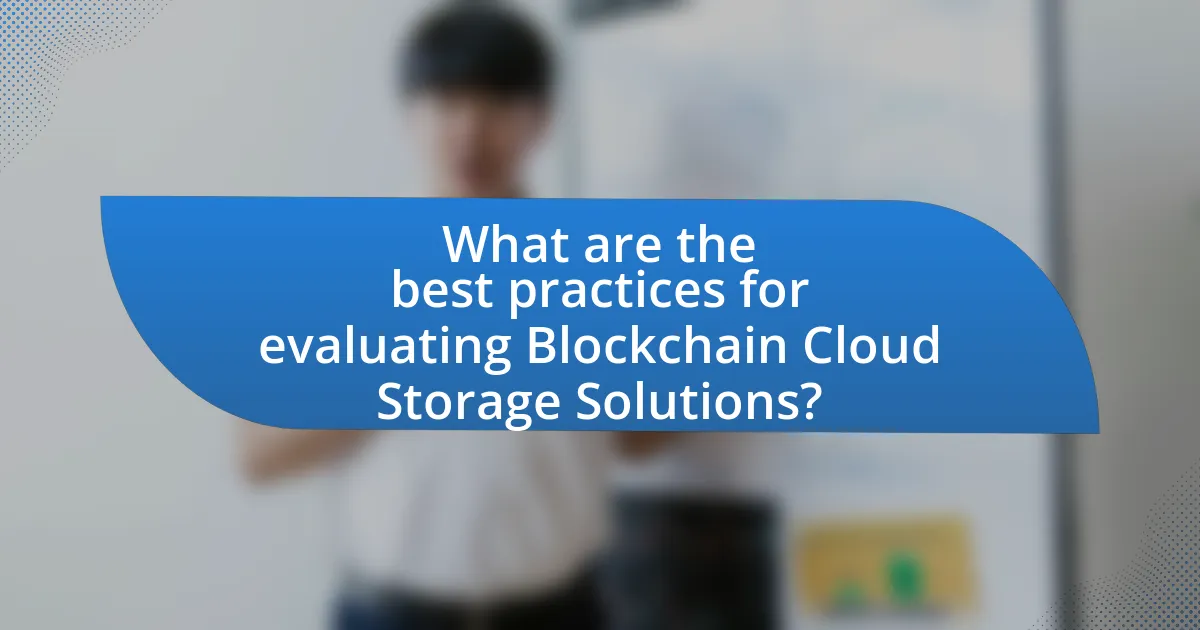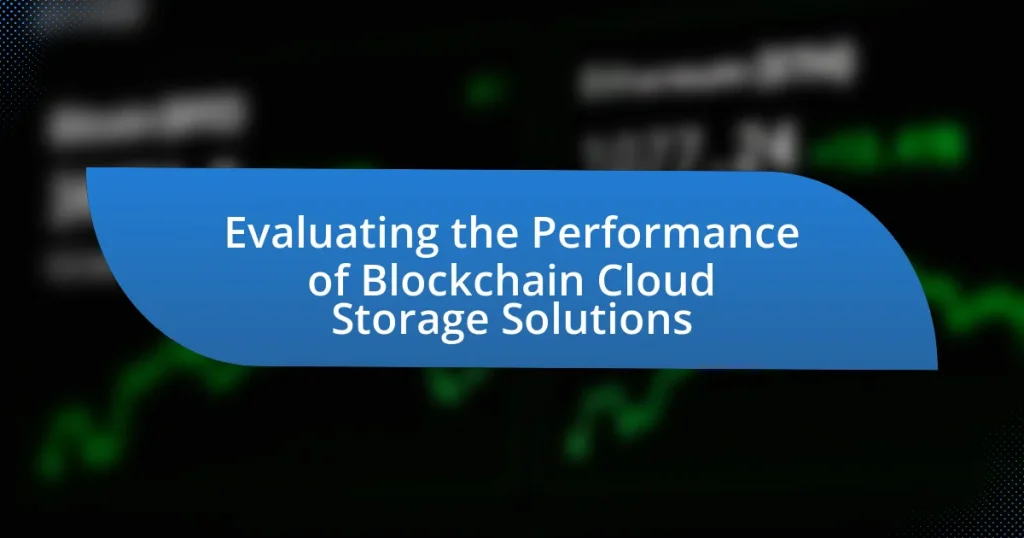Blockchain cloud storage solutions are decentralized systems that utilize blockchain technology to securely store and manage data across a distributed network. This article evaluates the performance of these solutions, highlighting their key features such as decentralization, enhanced security, and data integrity. It discusses how blockchain cloud storage differs from traditional cloud storage, the technologies that underpin these solutions, and the importance of performance metrics like throughput and latency. Additionally, it addresses the challenges users face when evaluating performance and offers best practices for assessment, ensuring that users can make informed decisions regarding their data storage needs.

What are Blockchain Cloud Storage Solutions?
Blockchain cloud storage solutions are decentralized storage systems that utilize blockchain technology to securely store and manage data across a distributed network. These solutions enhance data security and integrity by leveraging cryptographic techniques and consensus mechanisms, ensuring that data is tamper-proof and accessible only to authorized users. For instance, platforms like Filecoin and Storj exemplify this approach by allowing users to rent out unused storage space while maintaining data redundancy and availability through blockchain protocols.
How do Blockchain Cloud Storage Solutions differ from traditional cloud storage?
Blockchain cloud storage solutions differ from traditional cloud storage primarily in their decentralization and security features. Traditional cloud storage relies on centralized servers managed by a single entity, which can be vulnerable to data breaches and outages. In contrast, blockchain cloud storage distributes data across a network of nodes, enhancing security through cryptographic techniques and reducing the risk of a single point of failure. Additionally, blockchain solutions often provide greater transparency and control over data ownership, as users can verify transactions and access permissions directly on the blockchain. This decentralized approach not only improves data integrity but also fosters trust among users, as evidenced by the increasing adoption of blockchain technologies in various sectors for secure data management.
What technologies underpin Blockchain Cloud Storage Solutions?
Blockchain Cloud Storage Solutions are primarily underpinned by distributed ledger technology (DLT), cryptographic algorithms, and peer-to-peer networking. Distributed ledger technology enables decentralized data storage across multiple nodes, ensuring data integrity and transparency. Cryptographic algorithms, such as SHA-256, secure data through encryption, providing confidentiality and preventing unauthorized access. Peer-to-peer networking facilitates direct data sharing between users without intermediaries, enhancing efficiency and reducing costs. These technologies collectively ensure that Blockchain Cloud Storage Solutions are secure, reliable, and scalable, making them a viable alternative to traditional cloud storage systems.
What are the key features of Blockchain Cloud Storage Solutions?
Blockchain Cloud Storage Solutions offer key features such as decentralization, enhanced security, data integrity, and transparency. Decentralization eliminates reliance on a single entity, distributing data across a network of nodes, which reduces the risk of data loss or manipulation. Enhanced security is achieved through cryptographic techniques, ensuring that data is encrypted and only accessible to authorized users. Data integrity is maintained via immutable records on the blockchain, which prevents unauthorized alterations. Transparency is provided through the public ledger, allowing users to verify transactions and data access history. These features collectively enhance the reliability and trustworthiness of data storage solutions.
Why is evaluating the performance of Blockchain Cloud Storage Solutions important?
Evaluating the performance of Blockchain Cloud Storage Solutions is important because it directly impacts data integrity, security, and efficiency. Performance metrics such as speed, reliability, and scalability determine how effectively these solutions can handle data storage and retrieval tasks. For instance, a study by the International Journal of Information Management highlights that efficient blockchain storage can reduce data retrieval times by up to 50%, enhancing user experience and operational efficiency. Furthermore, assessing performance helps identify potential vulnerabilities, ensuring that data remains secure against breaches and unauthorized access. Thus, performance evaluation is crucial for optimizing the functionality and trustworthiness of blockchain cloud storage systems.
What metrics are used to evaluate performance?
Metrics used to evaluate performance in blockchain cloud storage solutions include throughput, latency, scalability, reliability, and security. Throughput measures the amount of data processed in a given time, while latency assesses the time taken to complete a transaction. Scalability evaluates the system’s ability to handle increased loads, and reliability indicates the system’s uptime and fault tolerance. Security metrics focus on data integrity, confidentiality, and access control. These metrics are essential for determining the efficiency and effectiveness of blockchain cloud storage solutions, as they directly impact user experience and system performance.
How does performance impact user experience and adoption?
Performance significantly impacts user experience and adoption by directly influencing the speed, reliability, and responsiveness of a system. High performance leads to quicker data retrieval and processing, which enhances user satisfaction and encourages continued use. For instance, a study by Google found that a one-second delay in page load time can reduce conversions by 20%. This statistic illustrates that users are less likely to adopt a service that does not meet their performance expectations. Furthermore, consistent performance fosters trust and reliability, essential factors for user retention in blockchain cloud storage solutions, where data integrity and accessibility are paramount.

What factors influence the performance of Blockchain Cloud Storage Solutions?
The performance of Blockchain Cloud Storage Solutions is influenced by factors such as network latency, data redundancy, consensus mechanisms, and encryption methods. Network latency affects the speed of data retrieval and storage, with lower latency leading to better performance. Data redundancy ensures data availability and reliability, impacting the overall efficiency of the storage solution. Consensus mechanisms, such as Proof of Work or Proof of Stake, determine how transactions are validated and can affect transaction speed and scalability. Lastly, encryption methods impact the speed of data access and security, as stronger encryption may slow down performance due to increased computational requirements. These factors collectively determine the effectiveness and efficiency of Blockchain Cloud Storage Solutions.
How does data redundancy affect performance?
Data redundancy negatively affects performance by increasing storage costs and complicating data management. When multiple copies of the same data exist, it requires more storage space, which can lead to higher operational costs and slower access times due to the need to manage and synchronize these copies. For instance, in blockchain cloud storage solutions, excessive redundancy can lead to increased latency during data retrieval, as the system must process multiple data sources. Additionally, maintaining consistency across redundant data sets can strain system resources, further degrading performance.
What role does network latency play in performance evaluation?
Network latency significantly impacts performance evaluation by affecting the speed and responsiveness of data transactions. In blockchain cloud storage solutions, high latency can lead to delays in data retrieval and transaction confirmations, which directly influences user experience and system efficiency. For instance, a study by Zhang et al. (2020) in the “Journal of Network and Computer Applications” found that a latency increase of just 100 milliseconds can reduce transaction throughput by up to 20%. This demonstrates that minimizing network latency is crucial for optimizing performance in blockchain applications.
How do consensus mechanisms impact storage efficiency?
Consensus mechanisms significantly impact storage efficiency by determining how data is validated and stored across a distributed network. For instance, Proof of Work requires extensive computational resources, leading to increased storage demands due to the need for maintaining large blockchain histories and transaction data. In contrast, Proof of Stake reduces the amount of data that needs to be stored by allowing validators to maintain only a portion of the blockchain, thus optimizing storage usage. Research indicates that networks utilizing lighter consensus mechanisms, such as Delegated Proof of Stake, can achieve up to 50% more efficient storage compared to traditional Proof of Work systems, as they require fewer nodes to store complete transaction histories.
What are the security implications of performance in Blockchain Cloud Storage?
The security implications of performance in Blockchain Cloud Storage include potential vulnerabilities arising from slower transaction speeds and increased latency. When performance is compromised, it can lead to delayed data verification and retrieval, which may expose the system to risks such as data breaches or unauthorized access. For instance, a study by Zhang et al. (2020) in the “Journal of Cloud Computing” highlights that inadequate performance can hinder the timely execution of smart contracts, thereby increasing the window of opportunity for malicious actors to exploit weaknesses. Additionally, lower performance can result in inadequate encryption and data integrity checks, further jeopardizing the security of stored data.
How does performance relate to data integrity and security?
Performance directly impacts data integrity and security by influencing the speed and efficiency of data processing and storage mechanisms. High-performance systems can quickly validate and verify data transactions, which enhances data integrity by reducing the likelihood of errors during data handling. For instance, blockchain technology, known for its decentralized nature, relies on performance metrics such as transaction throughput and latency to ensure that data remains accurate and tamper-proof. Studies have shown that systems with optimized performance can achieve up to 1,000 transactions per second, significantly improving the reliability of data integrity checks. Additionally, robust performance in security protocols, such as encryption and access controls, ensures that data remains protected against unauthorized access, thereby maintaining both integrity and security.
What are the risks associated with poor performance in Blockchain Cloud Storage?
Poor performance in Blockchain Cloud Storage can lead to significant risks, including data loss, security vulnerabilities, and reduced user trust. Data loss may occur due to inadequate redundancy or failure to retrieve stored data efficiently, which can compromise critical information. Security vulnerabilities arise when slow performance leads to inadequate encryption or delayed updates, making the system susceptible to attacks. Additionally, reduced user trust can result from inconsistent access speeds and reliability issues, ultimately affecting user adoption and the overall success of the blockchain solution. These risks highlight the importance of maintaining optimal performance in Blockchain Cloud Storage systems to ensure data integrity, security, and user confidence.

What are the best practices for evaluating Blockchain Cloud Storage Solutions?
The best practices for evaluating Blockchain Cloud Storage Solutions include assessing security features, scalability, performance, and compliance with regulations. Security features should encompass encryption methods, access controls, and data integrity mechanisms to protect sensitive information. Scalability is crucial as it determines the solution’s ability to handle increasing data loads without compromising performance. Performance evaluation should focus on speed, latency, and reliability metrics to ensure efficient data retrieval and storage. Compliance with regulations, such as GDPR or HIPAA, is essential to ensure that the solution meets legal requirements for data protection. These criteria are supported by industry standards and best practices, which emphasize the importance of a comprehensive evaluation framework for selecting effective blockchain storage solutions.
How can users effectively assess the performance of these solutions?
Users can effectively assess the performance of blockchain cloud storage solutions by analyzing key metrics such as speed, reliability, security, and cost-effectiveness. Speed can be evaluated through transaction throughput and latency measurements, which indicate how quickly data can be stored and retrieved. Reliability is assessed by examining uptime statistics and data redundancy features, ensuring that the solution maintains data integrity and availability. Security can be gauged by reviewing encryption standards, access controls, and compliance with regulations, which protect sensitive information. Cost-effectiveness is determined by comparing the total cost of ownership, including transaction fees and storage costs, against the benefits provided. These metrics provide a comprehensive framework for users to evaluate and compare different blockchain cloud storage solutions effectively.
What tools and frameworks are available for performance evaluation?
Tools and frameworks available for performance evaluation of blockchain cloud storage solutions include Apache JMeter, Gatling, and Hyperledger Caliper. Apache JMeter is widely used for load testing and performance measurement, allowing users to simulate multiple users and analyze performance metrics. Gatling offers a powerful framework for testing web applications, providing detailed reports on performance and scalability. Hyperledger Caliper specifically targets blockchain networks, enabling users to benchmark the performance of various blockchain implementations through predefined scenarios and metrics. These tools are validated by their adoption in industry practices and their ability to provide quantitative performance insights.
What benchmarks should be considered during evaluation?
During the evaluation of blockchain cloud storage solutions, key benchmarks to consider include scalability, security, performance, and cost-effectiveness. Scalability assesses the system’s ability to handle increasing amounts of data and users without degradation in performance. Security benchmarks evaluate the robustness of encryption methods, data integrity, and resistance to attacks, which are critical in protecting sensitive information. Performance metrics focus on transaction speed, latency, and throughput, ensuring that the solution meets user demands efficiently. Cost-effectiveness examines the total cost of ownership, including storage fees, transaction costs, and maintenance expenses, to determine the financial viability of the solution. These benchmarks are essential for a comprehensive assessment of blockchain cloud storage solutions, ensuring they meet both technical and business requirements.
What common challenges do users face when evaluating performance?
Users commonly face challenges such as data security concerns, scalability issues, and lack of standardization when evaluating performance in blockchain cloud storage solutions. Data security is critical, as users must ensure that their information is protected against breaches and unauthorized access, which can be difficult to assess due to varying encryption methods and protocols. Scalability poses another challenge, as users need to determine whether the solution can handle increased data loads without compromising performance, which is often not clearly demonstrated in evaluations. Additionally, the lack of standardization across different blockchain platforms makes it challenging for users to compare performance metrics effectively, leading to confusion and potential misjudgments in selecting the right solution.
How can users overcome these challenges?
Users can overcome challenges in evaluating the performance of blockchain cloud storage solutions by implementing a systematic approach that includes thorough testing, benchmarking, and utilizing performance metrics. Conducting comprehensive tests allows users to assess the speed, reliability, and scalability of different solutions. Benchmarking against established standards helps users identify the most efficient options available. Additionally, utilizing performance metrics such as transaction throughput, latency, and storage efficiency provides concrete data to inform decision-making. These methods enable users to make informed choices and optimize their use of blockchain cloud storage solutions effectively.
What are the most frequent misconceptions about Blockchain Cloud Storage performance?
The most frequent misconceptions about Blockchain Cloud Storage performance include the belief that it is inherently slower than traditional cloud storage and that it lacks scalability. Many assume that the decentralized nature of blockchain technology leads to increased latency; however, advancements in blockchain protocols, such as sharding and layer-2 solutions, have significantly improved transaction speeds. Additionally, the perception that blockchain cannot handle large volumes of data is incorrect, as many blockchain platforms are designed to scale efficiently, accommodating growing storage needs without compromising performance.
What tips can enhance the evaluation process of Blockchain Cloud Storage Solutions?
To enhance the evaluation process of Blockchain Cloud Storage Solutions, focus on assessing security features, scalability, and interoperability. Security features should include encryption standards and access controls, as these are critical for protecting data integrity and confidentiality. Scalability is essential to ensure that the solution can handle increasing data loads without performance degradation; solutions should be tested under various load conditions to verify this capability. Interoperability with existing systems and other blockchain networks is vital for seamless integration, which can be evaluated through compatibility tests and API assessments. These criteria are supported by industry standards and best practices, such as those outlined by the National Institute of Standards and Technology (NIST), which emphasize the importance of security and performance metrics in evaluating cloud storage solutions.


